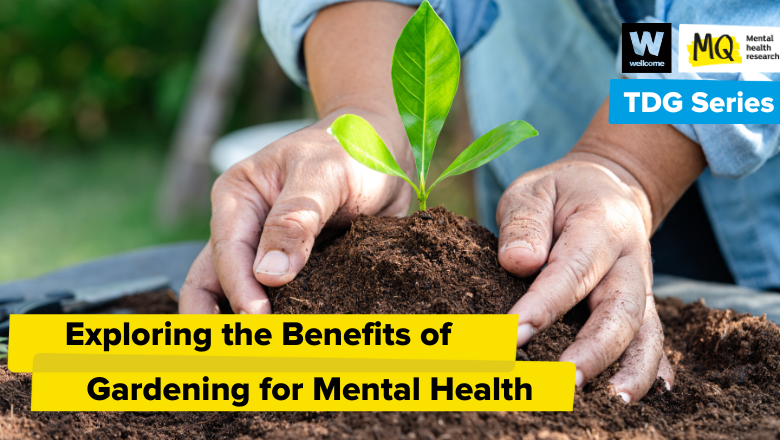
In 2024, MQ Mental Health Research created an opportunity, developed and funded by Wellcome, to support researchers outside psychiatry, psychology, and neuroscience to apply bold and novel ideas and methods from their discipline to mental health science. In this Transdisciplinary Research Grant series, we will go through each study, and explain why the results are vital to the future of mental health interventions.
Although gardening might seem like a hobby to some, recent research shows it could play a bigger role in mental health treatment than many people realize. Known as Social and Therapeutic Horticulture (STH), this type of therapy uses gardening activities like planting seeds, potting, digging, and weeding to help people manage symptoms of depression and anxiety.
Dr Carly Wood and her team at the University of Essex explored how effective STH is for improving mental health and what makes it a promising option for treatment.
What Did the Research Look At?
The review analysed 17 different studies involving 879 participants and focused on how gardening affected depression, anxiety, or both. Some sessions were held indoors, others outdoors, and a few used a mix of both settings. The activities ranged from short sessions of 30-40 minutes, with others lasting up to 3.5 hours. The volunteers took part anywhere from once a week to five times a week, over a period of four to sixteen weeks.
To understand how effective STH was, the studies compared it to other approaches like routine medical care or regular daily activities. In some cases, researchers simply measured how depression or anxiety changed in participants during the gardening sessions.
What Did They Find?
Carly’s team found that people who participated in STH reported feeling less depressed and anxious when compared to those in other treatment groups. Concerning depression, the effects were significant, while anxiety showed moderate improvements. Even in studies without comparison groups, participants often experienced notable progress by the end of the program.
However, the results weren’t the same across the research, as some studies showed bigger improvements than others, and there were challenges with how the studies were done. For example, many didn’t follow up with participants regularly or had small sample sizes, making it harder to draw reliable conclusions.
Why This Matters
This research highlights that gardening isn’t just good for growing plants—it can also help grow better mental health. STH might be considerably helpful for people dealing with a mix of physical, mental, and social challenges all at the same time. Combining gentle physical activity with a connection to nature and structured social interaction offers a unique way to support well-being.
What Needs to Happen Next?
While the findings are promising, better research is needed to fully understand the potential of STH. Future studies should compare gardening therapy directly to more common treatments for depression and anxiety, like medication or talk therapy. High-quality research could also help make STH more widely available and better integrated into mental health care plans.
If this happens, gardening could become a common part of routine mental health treatment. It might help people feel more in control of their recovery, reduce the chances of relapse, and ease the pressure on mental health services like the NHS.
The Bigger Picture
At its core, this is about offering people more options to take care of their mental health. STH could be a game-changer for those who find traditional treatments challenging or prefer something more hands-on. With further research and support, gardening might be vital for mental health care.




